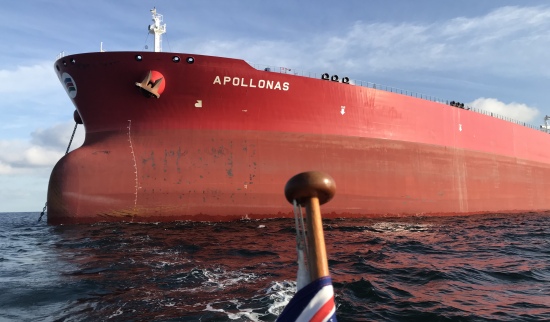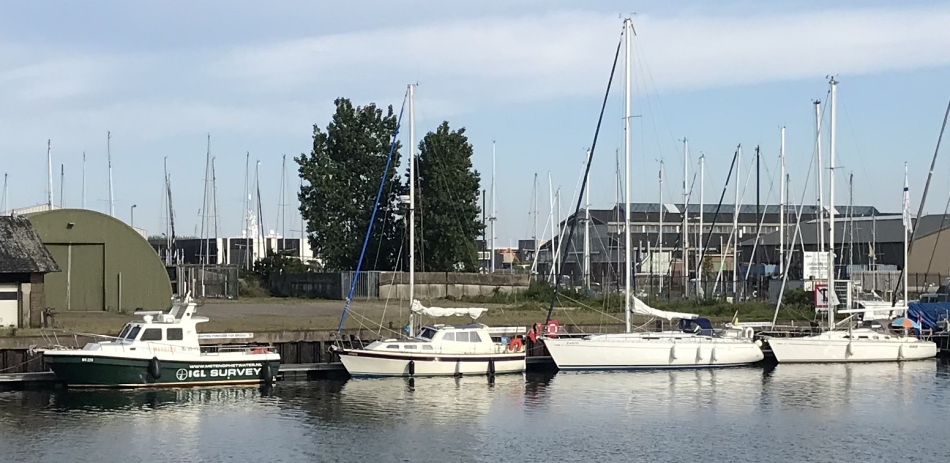 Approaching a Large Anchorage |
I sent him below as we crossed through the traffic separation zone, and then headed across the northbound shipping lane, managing to cross before a flotilla of tankers powered by. A beautiful sunrise greeted me, a cheery sight after a cold, bouncy night. Rex kindly provided some light entertainment by climbing out of his pit, whinging about cramp. "You need more salt in your diet," was my sympathetic response. A couple of hours later we were gliding alongside a large windfarm with an equally large anchorage in front of us. I was most impressed passing through this armada of sleeping leviathans. Rex took over at 8 am, and when I arose 11:30 we were off the coast of Belgium, weaving a path through ships entering and leaving the busy ports of Zeebrugge and Antwerp. The wind and tide were in sync with each other, so the sea state was much calmer.
 Anchored Empty Oil Tanker |
Mooring on a visitors (passanten) pontoon, I tried to find a harbourmaster and also ascertain where we could get our passports stamped. Since leaving the European Union, it was necessary for us to get our passports stamped by immigration control at the port of entry and port of departure. The harbourmaster was not around. I asked a few of the locals where we could get a passport stamped by immigration control. They were extremely friendly and helpful, and assured us, Tom, the harbourmaster would come and find us. They also tried to call immigration control on our behalf, but after umpteen attempts we all concluded that they had gone home for the day.
We gave up and returned to the boat. Meanwhile a Dutch boat moored on the pontoon, shortly followed by a German boat. The owner of the German boat was not the most welcoming of chaps when we volunteered to assist in taking his vessels ropes. His wife was more appreciative. To complete the invasion, a survey vessel tried to moor on to its usual position on the pontoon. We had to accommodate by moving boats around on the pontoon.
Then a Belgian chap came to chat with us. He hailed from Leuven, and kept his boat at Goes, Holland, since he and his wife enjoyed sailing around Holland. We discussed the relative merits of sailing in Holland versus the UK, concluding that Holland is probably cheaper than the UK in terms of mooring charges. We digressed onto the topic of how most of the surrounding towns were severely damaged during World War II. Attempts have been made to reproduce the buildings. He was quite knowledgeable on the matter, and went on to elaborate on how people had been conscripted during the war to work in German factories and mines.
A relative of his had escaped from a transport train and hid on a farm for the rest of the war. We moved on to discuss the Dutch people's ability to speak foreign languages. He pointed out that Dutch TV channels transmitted imported programmes in their original language, with subtitles. Children and adults have learned languages very quickly this way.
 The Visitor's Pontoon at Vlissingen: Survey Vessel, Duonita, German Yacht, Dutch Yacht |
The Golden Age of the Netherlands came to Vlissingen in the 17th century. Trade flourished under the Dutch East India Company and Dutch West India Company. And the Admiralty of Zeeland, one of five in the Dutch Republic, was established in Middelburg. This was also the time when Michiel de Ruyter made his name. This son of Vlissingen worked his way up to become the commander in chief of the Dutch fleet and won many sea battles. He was also a founder of the Dutch Marine Corps. Today Vlissingen is mainly noted for the yards on the Scheldt where most of the ships of the Royal Netherlands Navy (Koninklijke Marine) are built.
We wound up the day by walking into Vlissingen centre, probably against all the rules since our passports had not been stamped. We guessed as long as we did not have an accident or fall foul of the law, we would get away with it. We sat in the sun outside a Greek restaurant. The lady who ruled the roost came out and halted the fun of some small boys, presumably associated with the restaurant, and insisted they could no longer play football outside where customers were now starting to sit. Our waiter was a very chatty fellow. Soon we learned he had spent 24 years working in Dordrecht, and 20 years in Vlissingen. The food and drink was excellent, attested to by the large number of customers at the restaurant.
It had been a long day, we were whacked out, and returned to the boat for an early night.
